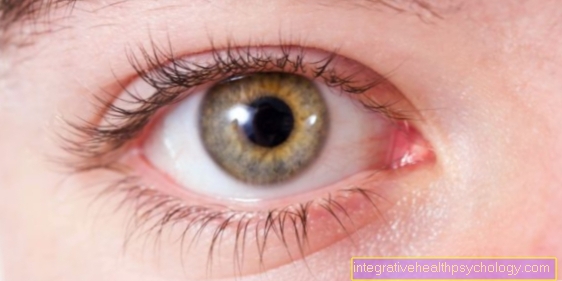Ophthalmologist
definition
Ophthalmology is a specialty of medicine and within this the ophthalmologist works. There are other specializations among the ophthalmologists, so that there are special specialists for the most specific areas of the eye and optimal care for the patient is made possible.
The duties of an ophthalmologist concern both general and specific areas. Ophthalmology, which is also known as ophthalmology or ophthalmiatry, consists of diagnostics, advice and finally treatment and follow-up care for the patient by the attending ophthalmologist.
In addition, the ophthalmologist deals with preventive (preventive) Measures to prevent deterioration in vision or the health of the eye, if possible.
The ophthalmologist also has his field in surgical interventions and his field of activity leads into the areas of other medical specialties, such as nose and throat medicine, internal medicine, neurology and dermatology (skin medicine).
In addition, knowledge of general medical aspects and surgical skills complete the range of work of an ophthalmologist.

Treatments
The ophthalmologist advises the patient and recommends Remedies and aidswhich he usually provides himself. He also discusses possible surgical procedures with the patient and advises on the area Orthoptics, pleoptics and offers the Occlusion therapy or surgical eye corrections for visual disturbances on.
Common illnesses
Common diseases of the eyes and the visual system are the Green star (glaucoma) and the Cataracts (cataract), such as Misalignments of the eyes (Squint), Destruction of the body's own lens of the eye and the Presbyopia (Presbyopia).
Pathological impairments of the Eyesight in the field of ophthalmologists. These include the myopia (Myopia), the Farsightedness (Hyperopia) and the Astuteness (astigmatism).
The ophthalmologist pays attention Undesirable developments and malformations of the eye and ensures in its diagnostics that a Squint, Night or color blindness, as well as that uncontrolled eye tremors can be recognized as early as possible and, if possible, treated.
In addition, all fall Imaging disturbances and anatomical areas of the eye and visual system in the field of responsibility of the ophthalmologist.
Systemic diseases that lead to vision disorders are also important for treatment and therapy for the ophthalmologist.
Diagnosis and examination options

The eyes of humans are very sensitive organs and disturbances in them can lead to severe impairment of the quality of life of those affected.
To determine the changes in the eye, the ophthalmologist has various examination methods and examination devices to select.
This includes the device for Determination of intraocular pressure (if glaucoma is suspected) and for Diagnostics of the visual field (e.g. for driving license test).
The ophthalmologist can use the so-called microscopic structures to create the finest microscopic structures in the various sections of the eye Slit lamp to see.
This slit lamp is usually a large device that is movably mounted on the examination table and can be found in every ophthalmologist's practice. Also devices for Determination of the chamber angle, to the Measure visual acuity and the Examination of the ametropia are available to the ophthalmologist.
If the eye disease has to be treated, the ophthalmologist uses the procedure laser. Here comes the modern one LASIK technology often used, which are very expensive and for this reason are usually only available in eye clinics.
Computerized treatment methods, such as the OCT (Optical coherence tomography) and the topography are available to the ophthalmologist for important examinations as well as various drugs and optical aids such as magnifying glasses.
Choice of ophthalmologist
Many people shy away from going to the ophthalmologist almost as much as they do not know what to expect there and what to expect from the dentist Fear of the follow-up costs a new one glasses or something like that.
When choosing a doctor, it is therefore important to ensure that a Basis of trust is present or one feels rather uncomfortable. If the waiting room is also carelessly designed and the staff is always unfriendly or overwhelmed, these are signs that you should rather look to another ophthalmologist.
The priority is, however, when choosing Qualification of the doctor and the possible Diagnosis and treatment options in practice. Especially with special diseases of the eye or special circumstances of the disease sometimes only a few come Specialty clinics in question.























.jpg)





